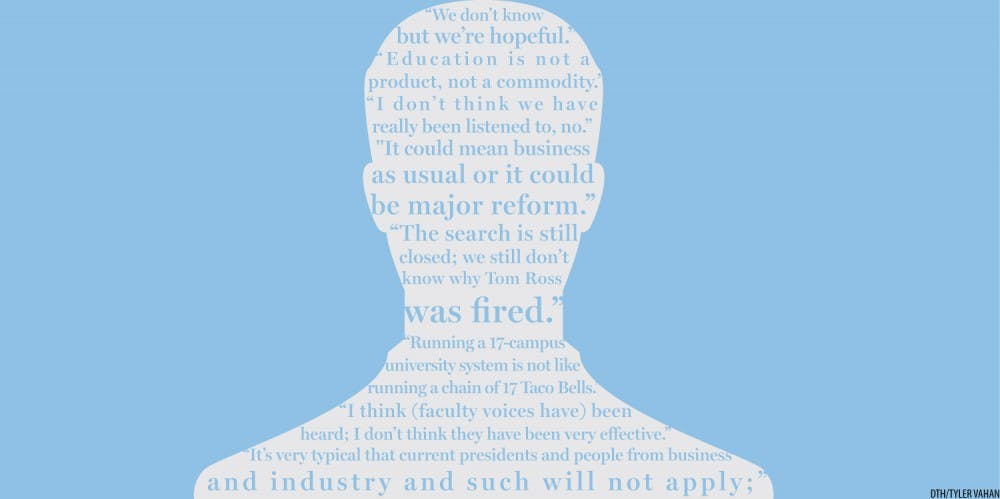Stone said the candidate recommendations could be announced by the board’s Oct. 30 meeting.
The BOG in April appointed a 12-member search committee comprising entirely board members, though one member resigned after a domestic violence charge.
A 40-member leadership statement committee was also selected to draft a profile of the ideal candidate.
The resulting 250-page report included feedback from university staff, faculty and students who indicated a strong desire for the next president to have leadership experience in higher education.
Only a third of BOG members ranked higher education experience in their top preferences.
Conflicting priorities
The debate surrounding what role a candidate’s professional experience plays in his or her becoming a university system president has popped up elsewhere.
The University of Iowa system selected former IBM executive and Harvard business school professor Bruce Harreld as its president Sept. 3, upsetting faculty who claim he lacks the necessary experience.
Jan Greenwood, a former university president and consultant for Greenwood/Asher & Associates — the search firm used in the University of Florida’s 2014 system president search — said candidates aim to be successful in whatever the board hopes to accomplish.
“It’s really measuring the match, if you will — the match between what the person has done and wants to do with what the university wants to have done,” she said.
Of the five UNC-system presidents in the institution’s history, only one has come from a business background: C.D. Spangler, who worked to keep the cost of higher education affordable.
Paul Gates, Appalachian State University’s faculty chairman, said education cannot be treated like a product.
To get the day's news and headlines in your inbox each morning, sign up for our email newsletters.
“Running a 17-campus university system is not like running a chain of 17 Taco Bells,” he said.
Bruce Cairns, UNC-CH faculty chairman, said the faculty would appreciate someone with an academic background. But, he said, it was most important the faculty and new president work together.
“If they don’t come from (an academic) background, we absolutely look forward to working with the chancellor, the Board of Trustees and all of the faculty to help work with them — educate them — to make this institution the best it can be,” he said.
It’s important to faculty that the president understands his or her diverse roles within the system, said UNC-Charlotte faculty President Jeffrey Leak.
“We want someone who’s going to be thoughtful, whether they come from the business community or any other background,” he said.
Jenna Robinson, president of the Pope Center for Higher Education Policy, said she thinks many candidates will have a background in education.
“They’re certainly taking into account what faculty and students and administrators from universities want to see,” she said. “The intention won’t be to alienate the entire system with their choice.”
The board in May chose search firm Isaacson, Miller — which has worked on searches for the University of California system president and Duke University’s provost.
Greenwood, of Greenwood/Asher & Associates, said her firm spends the first 30 days recruiting candidates. She said the company might call upwards of 350 people during that phase, and the firm’s role continues until a successor is named.
While she couldn’t comment on the University of Florida search specifically, Greenwood said the state operates under the Sunshine Law, which requires an open-government concept — and can deter some candidates.
“It’s very typical that current presidents and people from business and industry and such will not apply,” she said.
Leak said he understands the BOG’s need to protect prospective candidates while they are employed elsewhere.
Still, the closed nature of the process is frustrating, he said.
“We have to find that happy medium, I think, between respecting people’s privacy but also providing the public with as much knowledge as possible,” he said.
BOG members and members of the search committee declined to comment on the progress of the search or any potential candidates.
But an email dated Jan. 21 from board Chairman John Fennebresque released to The (Raleigh) News & Observer revealed that Art Pope, former budget director for Gov. Pat McCrory, would not be considered for the position.
Faculty weigh in
Among the board’s harshest critics since Ross’ dismissal have been university faculty — some of whom feel their voices haven’t been adequately recognized in the process.
Andrew Perrin, a UNC-CH sociology professor, said he feels the committee will do what is best for the system, but wishes the process were more open.
“I think that the process has been really distanced from the faculty, from the students, from the people who really know best what the university ought to be about,” he said.
Perrin also said choosing someone outside of academia might be a questionable choice.
“You’ve seen that play out at a number of our peer institutions, when they’ve had nonacademic folks hired into presidential roles,” he said.
Gates said faculty hope the new president is sensitive to academic values. But based on the closed nature of the process, he said he’s not sure their requests will be considered.
“I think (faculty voices have) been heard,” he said. “I don’t think they have been very effective.”
UNC-C faculty have expressed a desire for their input to be considered more, Leak said.
“The larger question is, as you move the system forward, will faculty be included in the decision-making?”
Stone said he hopes the committee is looking for someone who recognizes the size of the system and the importance of education in the state.
“We want them to be very cognizant — and I think they are — that this candidate is going to be looking after 16 universities and the (N.C. School of Science and Math), so it’s a huge job.”
Still, many feel Ross’ shadow will loom over his successor.
“Whoever it is, I’m hoping they can carry the banner that I think President Ross carried very graciously and effectively,” Leak said.
state@dailytarheel.com




